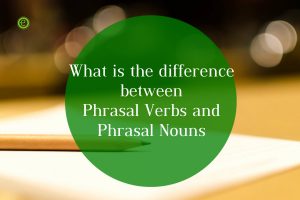You must be already aware as to how Phrasal Verbs and Phrasal Nouns are used. But the thing that really confuses people is the difference between the two things.
Let’s just see what would be the actual meaning of the definition as it goes.
Phrasal Verb vs Phrasal Noun – What do they mean?
By definition: Phrasal Verb can be considered something that is consist of two or more words. This combination can be a verb along with a preposition or a particle. When it is combined with different words and actions. When the words are formed into a closed or hyphenated compound, then it will transform into a phrasal noun. It can be employed along with adjectives as well. With this post, you can explain the distinctions.
We need to know here that phrasal verbs can make up a huge category of expression in English which can be used to substitute with a one-word noun and can be formed by making the standards of a two-phrasal verb.
Examples of Phrasal Nouns and Phrasal Verbs.
You can check out the example and it will understand you in a better way.
- I didn’t wish to put up all my strength into modifying stuff.
- I had to take up all the exams but I was still not aware what kind of exam was it.
- You need to check how strong the tendency for such hyphenated forms can be taken as evolved and it can be single words. If you see that both the versions can be considered as formal.
It would be easy for you to check that most of the phrasal verb consisting of a verb and adverb and it can be combined together. You will have to make sure that some of the adverbs can be involved and they can also function as a preposition which will not let this confuse you. Suppose you check the phrase,
- Cool down the bottle.
Then the word ‘down’ is considered as an adverb.
So it will actually consist of a verb and a preposition with this rarely causing problem. It will help you to frame some really good sentences without any grammatical mistakes. But before all this, you must know briefly about nouns and what it is exactly. The different ways it can follow up to see what a verb is and an adverb is.
You might come across a very long list of phrasal ver and it can be related to one-word which will be helpful in noun formation. With different examples, you may help and understand the standard difference in English Grammar. It won’t be helpful to you if you are not clear about the nouns or verb or adverb. For example, you need to include one-word which would form an adjective rather than a noun. If the words are involved then immediately it will be preceded by “to” you probably need a two-word phrasal verb. If you check that it needs to be tempted and it can be one-word spelling. You can also try out a two-word or hyphenated form. You must ensure that it must look better.
There would be numerous examples that would be easy to walk-in and walk-out. One always need to perform that a turn-around is important but comes up and it will come up with a work-around. You can see that a sentence with the word blow-up is not the same as a blowout. Moreover, hand-down is not the same and it might someday be coined to describe an edict. If you check some sentences, that make us of the word ‘hand-me-down’ then it will be different from ‘hand-down’. They do not bring up a lot of difference but yes it is evidently visible.
Conclusion:
Hence, we know what is the exact difference between Phrasal Verbs and Phrasal Nouns. EnglishBix hopes that you have understood it well. But still, if you feel that something is difficult to understand then you can get back to us through our comment section.


